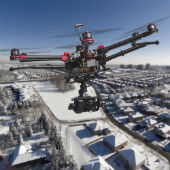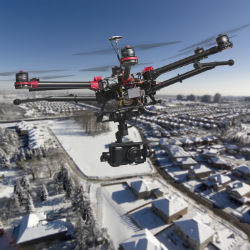 Drones: they’re like flying stalker robots.
Drones: they’re like flying stalker robots.
Sure, anyone with a camera can snap photos of you and your family on the beach, but drones can do that over your supposedly private spaces, such as your back yard.
Just what, exactly, is a privacy-conscious person to do about unmanned aerial vehicles (UAVs) beating their nosy little rotors over an individual’s private airspace?
Well, there’s the upcoming Rapere drone, a sort of cannibal anti-drone drone that the manufacturer says will hover over a target drone and lower webbing to snare its rotor blades: a prospect that sounds satisfyingly crunchy.
And there’s always shooting them down, which gives you the satisfaction of potentially jumping up and down on them and cursing melodramatically.
But both of these could mean the drones fall and hurt somebody. On top of all that, it’s probably illegal. So don’t do it.
Do not despair, and do not begin training your attack falcon. There’s still one more hope for the drone-phobic.
It’s called the NoFlyZone: a service that lets users input their addresses with the aim of keeping the airspace above their homes drone-free.
NoFlyZone.org registers each address along with its GPS coordinates, which are then relayed to drone manufacturers to create a geofence around the home and render their products unable to fly over the property.
Now, all we need to do is to get the drone manufacturers on board.
The few drone makers who’ve signed on include HEXO+, the company behind the auto-tracking drone that amassed more than $1 million (£649,772) in Kickstarter funding last year; Ehang, makers of the recently unveiled Ghost Drone; DroneDeploy, a drone management platform; electric aviation company Yuneec; Horizon Hobby, PixiePath and RCFlyMaps.
That list leaves out major drone makers DJI and 3D Robotics: big omissions, given that, according to TechCrunch, DJI alone “probably accounts for the vast majority of drone sales in the United States.”
Even if the major drone makers do agree to go along with geofencing people’s homes at their request, it’s not clear that NoFlyZone has the right to protect personal airspace, which, at least in the US, is under the control of the Federal Aviation Administration.
What do you think, does NoFlyZone have a chance? And does it even matter whether quadcopters are banned over your airspace, given that satellites – the truly professional stalking toys – have much better imaging capabilities?
Please do let us know your thoughts in the comments section below.
Image of drone courtesy of Shutterstock.
